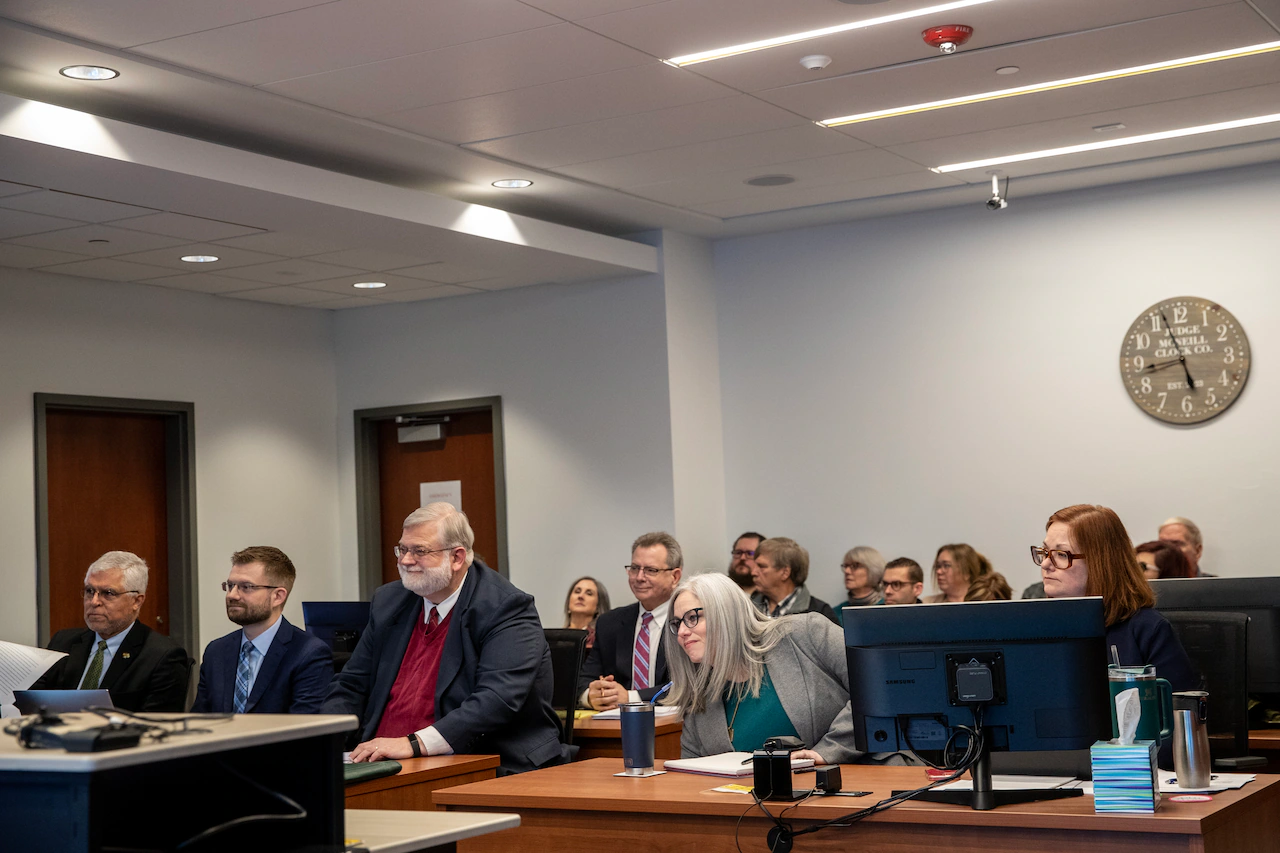Copyright Kalispell Inter Lake

Rebecca Milligan never imagined she would end up in an Army recruitment office. Both her parents had built storied careers in the United States Air Force — her mother as a mathematician at the U.S. Air Force Academy and her father in the space program, developing technology that would later be employed at the Haleakalā Observatory in Hawaii — but Milligan had never been interested in keeping up the family legacy. It was Milligan’s commitment to a career in nursing that first put her on the path to a military career more than 15 years ago. "My military service set me up to be where I am today, 100%,” said Milligan, who now works as a family nurse practitioner for Logan Health’s primary care unit. As a 16-year-old, Milligan witnessed what she described as a massive rollover accident. The victims were strangers, but Milligan still rushed into action and helped perform CPR until first responders arrived. “It was devastating,” she said in a 2017 interview with the U.S. Army Reserve’s media team. “It was very heartbreaking to see the amount of trauma that occurred to these people.” Milligan never learned what happened to the victims, but the experience sparked an interest in medicine and nursing. Her parents stoked Milligan’s curiosity by arranging for her to shadow a family friend at the nearby Air Force clinic. Two decades later, Milligan said she still thinks about the compassion and empathy the nurse showed to her patients. “That just stuck with me,” she said. After graduating high school, Milligan enrolled in the pre-nursing track at Montana State University. Her grades were passable, but Milligan said she worried about getting accepted into a traditional nursing program, so she decided to enroll in the Reserve Officers Training Corps. More commonly known as ROTC, the program would let her pursue a nursing degree while training to become a military officer. ASSUMING SHE would follow in her parents’ footsteps, Milligan first stopped in at the Air Force recruitment office, but she found out the service branch wanted doctors, not nurses. Not one to compromise on her goals, Milligan turned heel and walked down the hall to the Army recruitment office. There, she was readily accepted into the ROTC’s nursing track. Milligan quickly found that she enjoyed the structure and discipline of ROTC. She ran plenty of drills and shot plenty of guns, but the training courses also pushed her to practice less technical skills, like communication and teamwork. “You learn the basics,” said Milligan of the experience. “You learn how to be a solider and you learn how to be a leader.” After graduating in 2010, Milligan received her first duty assignment to the oncology ward of Tripler Army Medical Center in Honolulu, Hawaii. She was quickly transferred to the stepdown unit, which served as an intermediary between the intensive care unit and the general hospital wards. There, Milligan said she flourished. “That’s where I grew the most in terms of nursing,” said Milligan. “[I had] a lot of exposure to everything the human body can handle.” Her own biggest challenges were yet to come. Three years into her tenure at the medical center, Milligan was up for a promotion to captain. The rank seemed assured, considering Milligan’s stellar work record and clear expertise. But when the list was published, Milligan’s name wasn’t on it. “It changed my life. It changed my goals. It changed everything,” she recalled. Milligan later learned that the Army was in a drawdown period. Supervisors advised her that she was unlikely to be promoted while the staffing cuts were in place, but Milligan wasn’t ready to abandon what she now saw as a lifetime career. Husband and new baby in tow, she moved to Lakewood, Washington to start a new assignment in the cardiac clinic at Madigan Army Medical Center. She continued to receive award nominations and kudos from patients, supervisors and fellow nurses alike, but, when the next round of promotions was posted, Milligan’s name was still absent. The omission was even more devastating this time around. Officers who are not selected for a promotion twice are typically separated from the military. Milligan was heavily pregnant at the time, and her supervisor was so concerned the bad news would send her into early labor they withheld the results for a few days. The supervisor eventually told Milligan she hadn’t been selected. Then, they asked her if she wanted to continue her military service. Milligan didn’t hesitate. “Yes,” she said. “The military was going to be my life career.” The supervisor helped Milligan enlist in the U.S. Army Reserves. Unlike active-duty military members, most reservists only work for the military part-time. They train for one weekend every month and two weeks a year, oftentimes while pursuing a full-time civilian career. In times of conflict, reservists can be called into active duty. Milligan joined an Army Reserve unit based in Helena. She moved her family to Kalispell to be near family and found a nursing job at Logan Health. In between hospital shifts, reservist training and caring for her two kids, Milligan went back to school. She received her master’s degree in nursing in 2020, a few months after the onset of the Covid-19 pandemic. WORKING THROUGH a global medical emergency was far from easy, but Milligan said her experiences in the military gave her a leg up. Training with ROTC and then with the Army Reserves, she was frequently thrown into situations where she had to apply her medical expertise in innovative ways. During one particularly memorable assignment with the Army Reserves, Milligan worked as a makeup artist, prepping volunteers and medical dummies for training exercises. She spent weeks detailing bloody lacerations and shading in bruises in an effort to lend a sense of realism to the scenarios. The work was not only gory, but highly meticulous as Milligan’s renderings needed to be anatomically accurate. “Having the medical knowledge was really helpful. When you deglove a foot, you have to remember there’s tendons in there. It’s not just a foot,” said Milligan. “So that was really fun.” Other assignments had her shadowing military nurses or running field drills. In 2021, Milligan was promoted to captain and assigned to a logistics unit where she managed the behind-the-scenes administration of food, transportation and lodging for hundreds of reservists. She recently obtained the rank of major and now works as an inspector general, helping reservists solve disputes and investigating allegations of misconduct. “It’s just a different way to help soldiers,” said Milligan of her newest position. “We get to go out and talk with soldiers and figure out the root cause of issues.” Milligan said she plans to continue in the Army Reserves for a long time. Part of her commitment is practical, as Milligan said her job as a reservist comes with benefits she wouldn't otherwise get. Part of it is competitive — Milligan said it “would be really freaking cool” to be promoted to lieutenant colonel, the same rank as both of her parents. But the biggest source of motivation for Milligan is her drive to help others. Whether she’s mediating a dispute between soldiers or helping a patient walk for the first time after surgery, Milligan said her goal remains the same. “Having somebody come in and tell me they feel better is just an awesome win in my world,” she said.



